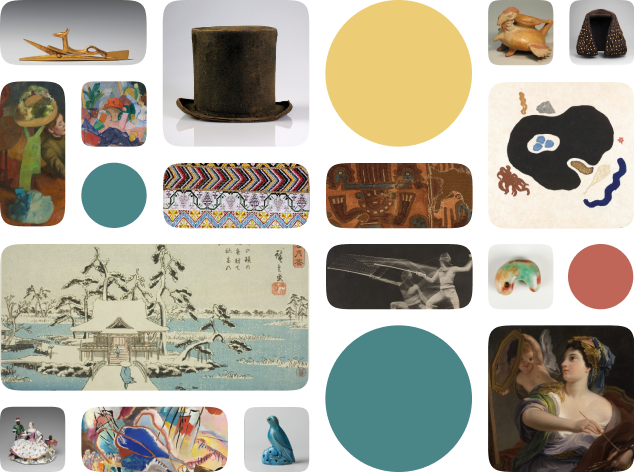Female Figure
Creator Name
Cultural Context
Date
Source
About the work
Ancient Egyptians would place fertility figurines in tombs to accompany the deceased in their afterlives. Middle Kingdom artists often made them of faience, a glazed, composite quartz material believed to have special powers. The material and applied decorations ensured the figures' safe passage through the underworld.
This female figure's horned hairstyle is associated with the primeval goddess Hathor, depicted as a woman with the head of a cow. Her body is painted with jewelry and tattoos reflecting the style conventions of Hathor cults. The cowrie shell girdle painted around her waist is a symbol of fertility and a common dance ornament. Dance was central to the worship of Hathor.
Other symbols attributed to Hathor worshippers include geometric dots, dashes, and chevron designs. These symbols are present on this figure's thighs and belly as tattoos. In the Middle Kingdom, primarily women wore tattoos as protective amulets.
This female figure's horned hairstyle is associated with the primeval goddess Hathor, depicted as a woman with the head of a cow. Her body is painted with jewelry and tattoos reflecting the style conventions of Hathor cults. The cowrie shell girdle painted around her waist is a symbol of fertility and a common dance ornament. Dance was central to the worship of Hathor.
Other symbols attributed to Hathor worshippers include geometric dots, dashes, and chevron designs. These symbols are present on this figure's thighs and belly as tattoos. In the Middle Kingdom, primarily women wore tattoos as protective amulets.
Metropolitan Museum of Art Object Description
Statuette, female
Work details
"--" = no data available
Title
Creator
Worktype
Cultural Context
Material
Dimensions
Technique
--
Language
--
Date
Provenance
Style Period
Rights
Inscription
--
Location
Source
Subjects
Topic
Curationist Metadata Contributors
All Works in Curationist’s archives can be reproduced and used freely. How to attribute this Work:
Unknown, Female Figure, circa 1850–1750 BCE. Metropolitan Museum of Art. An artist painted this faience figure with jewelry and tattoos reflecting the stye conventions of Middle Kingdom women. Public Domain.
Help us improve this content!
Let our archivists know if you have something to add.
Save this work.
Start an account to add this work to your personal curated collection.
